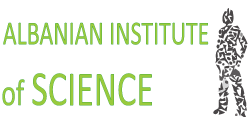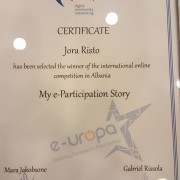Albania is awarded the European prize for using Information and Communication Technologies
Evaluation based on the inspiring stories presented by representatives of participating countries
Author: Erisa ZYKA
Broadcast by ABC News TV
The Albanian society is among the most active European societies in using Information and Communication technologies. In other words, Albanians, and mainly young Albanian men and women use social networks like FB and Twitter, but it was even awarded a prize. Even though non-EU countries, Albania and Serbia are part of an electronic network of 11 countries, among other EU member countries. This was enabled thanks to the Albanian Institute of Science, which has included Albania in the Telecenter Europe network, which, through the optimal use of Information and Communication Technologies, intends not only to fight social exclusion and poverty, but also increase citizen’s participation in political decision-making through electronic instruments.
At a ceremony that took place in the European Parliament, the winners of an electronic participation contest, which had presented inspiring stories of active citizenship, were awarded prizes of appreciation. Jora Risto is one of the 12 winners among hundreds of stories presented on how European young people use instruments of electronic participation in order to raise public awareness, influence, or solve social issues. The story for which Jora was awarded the price represents an important moment of civic participation in Albania. She presented the story of the ‘Students of November 2013’, who managed to mobilize protests against the process of dissembling the Syrian chemical weapons in Albania.
In EU member countries, active electronic citizenship may lead not only to protests being organized against certain decisions, but even to changes in the legislation. According to the Executive Director of Telecenter Europe network, Gabriel Rissola, active electronic participation is promoting democratic processes of societies among societies themselves.
Gabriel Rissola: “The so-called ‘Spanish Revolution’ of 15 May was a process that mobilized a lot of people, millions of citizens in Spain. The entire process started through phone calls with people being informed about a protest that was going to take place in the center of Madrid. There were many proposals made by, let’s say, people’s assemblies, but none was translated into changes to the legislation. Nothing happened. That is why it was very interesting to hear the case of Estonia today, where protests managed to be materialized into 7 new laws”.
Active electronic participation intends to make best use of citizens’ initiative in European decision-making. Based on Lisbon Treaty, if 1 million signatures are collected on a given issue, the European Commission is expected to initiate its legislative process on that issue.
Broadcast on13 December 2015 on TV ABC NEWS




